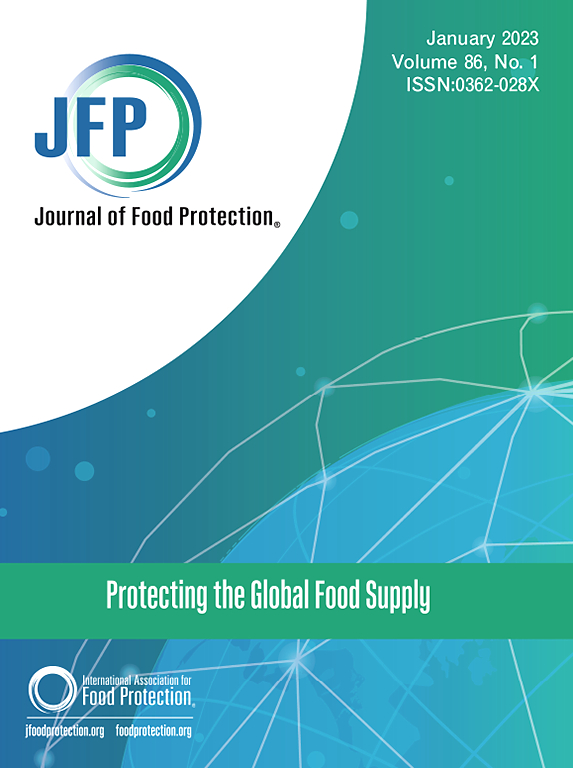d -木糖和l -苯丙氨酸在蒸煮过程中形成抗菌美拉德反应产物的研究。
IF 2.8
4区 农林科学
Q3 BIOTECHNOLOGY & APPLIED MICROBIOLOGY
引用次数: 0
摘要
d -木糖和l -苯丙氨酸在121℃加热1h产生的美拉德反应产物(MRPs)抑制蜡样芽孢杆菌和产气荚膜梭菌的生长。本研究考察了具有抗菌作用的MRPs能否在常压下的食物炖煮过程中形成,并抑制菜肴中的孢子形成细菌。在环境压力(< 100℃)下,通过在磷酸盐缓冲液中加热d -木糖和l -苯丙氨酸成功制备了MRPs,其抗菌效果随着温度、加热时间和底物浓度的增加而增强。在95°C焖煮1-3 h时形成的MRPs将蜡样芽孢杆菌和产气荚膜芽孢杆菌的生长延迟至25°C时的感染剂量(10⁶CFU/mL)。蜡样芽孢杆菌在咖喱汤中的延迟时间分别为9.8、20.3和28.5小时,在牛肉碗中的延迟时间分别为7.4、15.3和26.1小时。对于产气荚膜梭菌,1小时加热延迟生长约13.6 h,而2小时和3小时加热抑制生长的程度不足以计算达到感染剂量的时间。感官评估显示,MRP的产生对食物外观的影响很小,但对气味有负面影响。尽管存在这种限制,但在炖过程中加热d -木糖和l -苯丙氨酸的简单方法为控制煮熟的菜肴中的孢子形成细菌提供了一种很有前途的方法。本文章由计算机程序翻译,如有差异,请以英文原文为准。
Formation of Antibacterial Maillard Reaction Products From D-xylose and L-phenylalanine During Stewing Cooking
Maillard reaction products (MRPs) produced by heating D-xylose and L-phenylalanine at 121 °C for 1 h have been reported to inhibit the growth of Bacillus cereus and Clostridium perfringens. This study investigated whether MRPs with antibacterial effects could be formed during the stewing cooking of foods at ambient pressure and inhibit spore-forming bacteria in dishes. MRPs were successfully produced by heating D-xylose and L-phenylalanine in phosphate buffer at ambient pressure (<100 °C), with antibacterial effects increasing with temperature, heating time, and substrate concentration. During stewing, MRPs formed at 95 °C for 1–3 h delayed the growth of B. cereus and C. perfringens to an infection dose (106 CFU/mL) during 25 °C storage. For B. cereus, delays were 9.8, 20.3, and 28.5 h in soup curry and 7.4, 15.3, and 26.1 h in beef bowl. For C. perfringens, 1-hour heating delayed growth by ∼13.6 h, while 2- and 3-hour heating suppressed growth to insufficient levels to calculate the time to reach the infection dose. Sensory evaluation revealed that while MRP production had minimal impact on food appearance, it negatively affected smell. Despite this limitation, the simple method of heating D-xylose and L-phenylalanine during stewing offers a promising approach to control spore-forming bacteria in cooked dishes.
求助全文
通过发布文献求助,成功后即可免费获取论文全文。
去求助
来源期刊

Journal of food protection
工程技术-生物工程与应用微生物
CiteScore
4.20
自引率
5.00%
发文量
296
审稿时长
2.5 months
期刊介绍:
The Journal of Food Protection® (JFP) is an international, monthly scientific journal in the English language published by the International Association for Food Protection (IAFP). JFP publishes research and review articles on all aspects of food protection and safety. Major emphases of JFP are placed on studies dealing with:
Tracking, detecting (including traditional, molecular, and real-time), inactivating, and controlling food-related hazards, including microorganisms (including antibiotic resistance), microbial (mycotoxins, seafood toxins) and non-microbial toxins (heavy metals, pesticides, veterinary drug residues, migrants from food packaging, and processing contaminants), allergens and pests (insects, rodents) in human food, pet food and animal feed throughout the food chain;
Microbiological food quality and traditional/novel methods to assay microbiological food quality;
Prevention of food-related hazards and food spoilage through food preservatives and thermal/non-thermal processes, including process validation;
Food fermentations and food-related probiotics;
Safe food handling practices during pre-harvest, harvest, post-harvest, distribution and consumption, including food safety education for retailers, foodservice, and consumers;
Risk assessments for food-related hazards;
Economic impact of food-related hazards, foodborne illness, food loss, food spoilage, and adulterated foods;
Food fraud, food authentication, food defense, and foodborne disease outbreak investigations.
 求助内容:
求助内容: 应助结果提醒方式:
应助结果提醒方式:


